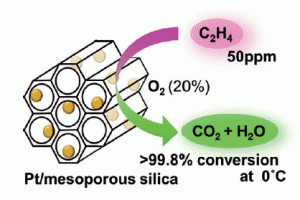Getting fresh with nanoparticles
 Ripening fruit, vegetables, and flowersrelease ethylene, which works as a plant hormone. Ethylene accelerates ripening, so other unripened fruit also begins to ripen—fruit and vegetables quickly spoil and flowers wilt. Japanese researchers have now introduced a new catalytic system for the fast andcomplete degradation of ethylene using platinum nanoparticles. This system could keep the air in warehouses ethylene-free, keeping perishable products fresh longer.
Ripening fruit, vegetables, and flowersrelease ethylene, which works as a plant hormone. Ethylene accelerates ripening, so other unripened fruit also begins to ripen—fruit and vegetables quickly spoil and flowers wilt. Japanese researchers have now introduced a new catalytic system for the fast andcomplete degradation of ethylene using platinum nanoparticles. This system could keep the air in warehouses ethylene-free, keeping perishable products fresh longer.
Ethylene released from fruits and vegetables accelerates their spoiling even in refrigerators. To oxidatively remove traces of ethylene from a gas mix, supported metal nanoparticles were tested. A Pt catalyst supported on mesoporous silica gave complete conversion of 50 ppm ethylene even at 0 °C, a previously unattained level that remains steady over longer periods and after multiple uses. IR experiments suggest the facile oxidation of CO over Pt on the silica supports is the key to the catalytic activity.
It is very important for wholesalers to remove traces of ethylene from warehouses and cold-storage facilities where fruit, vegetables, and flowers are stored. Previous biotechnological removal methods are expensive, complex, or ineffective, it says. The search for a suitable catalyst for the oxidation of ethylene has also not been very successful. The stumbling block has been the low temperature at which the process must work.
The catalyst is made by stirring the support with an aqueous solution of a platinum salt for 18 hours. The support is then dried and heated first under oxygen and then under hydrogen. After this process, the large pores of the silicon dioxide material contain platinum particles with a size of about 2.4 nm. This particle size, as well as the effect of the silica, seems to be particularly favourable for the reaction.

































